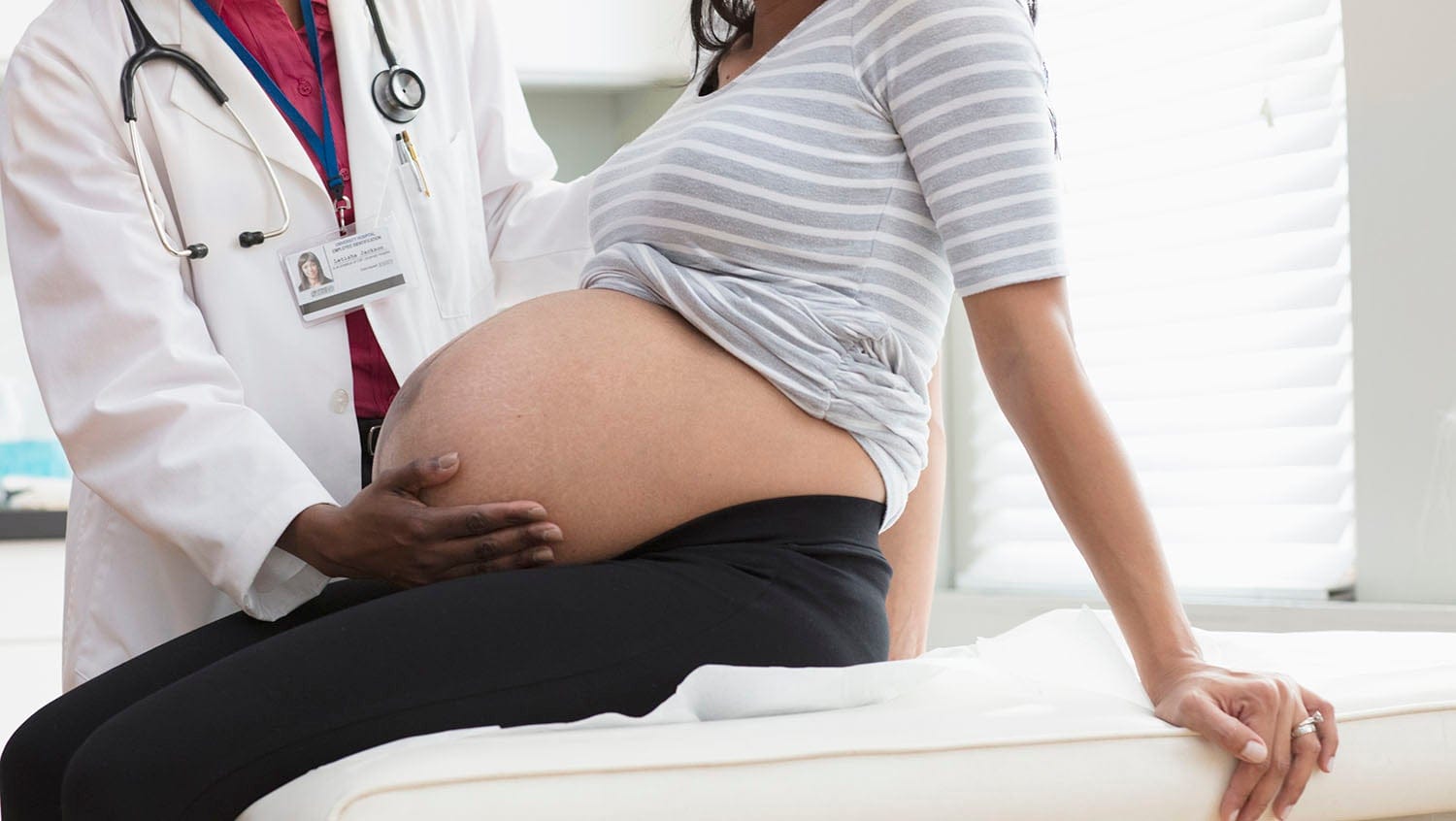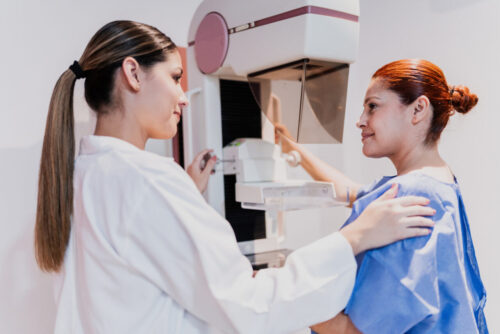
Getty Images
It's healthcare providers' responsibility to start the conversation and ensure pregnant patients are empowered with information to make a decision.
Being pregnant or trying to conceive amid the coronavirus pandemic brings a host of worries for expectant mothers. At the top of the list is the decision whether or not to receive the Pfizer-BioNTech or Moderna COVID-19 vaccine, both of which have been approved for emergency use by the Food and Drug Administration and will soon be available to the general public. Like in most U.S. clinical testing, pregnant and breastfeeding women were excluded from the initial vaccine trials. So, while COVID-19 cases continue to surge across the United States, these patients will rely on their healthcare providers to weigh the risks and benefits of receiving the COVID-19 vaccine when it becomes available to them.
Christina Yarrington, MD, FACOG, a maternal fetal medicine physician at Boston Medical Center, is accustomed to aiding her patients in vaccine decisions, including counseling on the Tdap and influenza vaccines, which are recommended in the third trimester. However, advising patients about the COVID-19 vaccine presents unique challenges. Physicians must help women weigh the absence of specific vaccine data for pregnant women against their increased risk of severe illness due to COVID-19 infection and the potential risk of preterm birth.
The CDC currently advises that people who are pregnant and part of a group recommended to receive the vaccine may choose to be vaccinated, and they should turn to a healthcare provider to make an informed, individual decision. With vaccines scheduled to roll out in April to the general public in Massachusetts, HealthCity spoke to Yarrington about physicians’ critical role in raising the discussion of the COVID-19 vaccine with pregnant patients and how she approaches the conversations.
HealthCity: The frequency of appointments during pre-conception and pregnancy presents a unique opportunity for relationship-building between a patient and their doctor. What is the physician’s role in informing a pregnant patient’s decision about the COVID-19 vaccine?
Christina Yarrington, MD, FACOG: I think any clinician who has a longer-term relationship with a patient, whether it’s their OB doctor, their midwife, their primary care doctor, is without a doubt the best person to bring up a conversation about vaccination. There are good data that a trusted doctor in particular is valued by an individual across community more so than what’s on the news, more so than information from their local or state government, or even to some degree, their local community leaders.
It’s a powerful thing to have that relationship and trust with somebody. It’s healthcare providers’ responsibility to start the conversation — not to convince somebody to have the vaccine but to make sure they’re empowered with information to make that decision.
HC: How do you open the dialogue with your patients about the vaccine? Is there a way to alleviate pressure that patients may feel in making the decision whether to get the COVID-19 vaccine?
CY: I start the conversation very transparently with the line, “There’s not a right answer here. There’s no one who can tell you the right thing to do; this is about what’s right for you.” Getting a vaccine now or waiting for more information from prospective studies that are underway to collect data on the implications of the vaccine in pregnancy and newborns are both reasonable options. My goal as we have our conversation is to help support the patient in the decision that she feels is right for her.
Still, we must help patients weigh known risk against unknown risk: Are you somebody who has more unease with a known risk or more unease with an unknown risk? Weighing how you feel about your personal risk for COVID-19 versus getting the vaccine without trial data in pregnant and lactating populations is the first step to figure out where you land.
Presenting the known risk, I tell patients a pregnant person is 3 to 5 times more likely to be intubated, 3 to 5 times more likely to end up in the ICU for some period of time, and has a slightly higher risk of dying from COVID-19 complications than would the twin sister of the person who is not pregnant. Also, some of the early COVID-19 studies suggest that preterm birth is more likely for women with COVID-19 infections, but it’s unclear if this is due to preterm labor or if physicians are inducing patients over concern for the health of the mother and the baby.
This is a perfect example of a model for shared decision-making, which is a conceptual framework when there are two reasonable acts to take relative to what decisions to make in a medical or clinical scenario that have to be weighed according to the person’s individual values.
HC: The COVID-19 vaccine is currently untested in pregnant and lactating women. How do you discuss this lack of safety data with your patients? Are patients asking you to extrapolate data from the vaccine trials to help inform their decisions?
CY: I’ve done consults for various clinical colleagues who are facing the decision to receive the vaccine, from doctors to nurse practitioners, to nurses and front desk administrators. Almost all of them so far have been pregnant. First, I acknowledge the extremely limited data from Pfizer-BioNTech trials of 12 women who happened to become pregnant likely very soon after they got the vaccine — but in my opinion, it doesn’t qualify as data, and I acknowledge that I wouldn’t advise my patients on a study of only 12 women. Then, I talk about the biology.
The first big talking point is that the effect of the vaccination is fairly localized to the arm. An mRNA vaccine is injected in the deltoid and it tells those muscles to look like COVID-19 temporarily so a patient’s immune system generates antibodies and protects their entire system against COVID-19 infection. For something to affect the developing baby, it has to be able to cross the placenta, which is a highly specialized filter. That is, for this vaccine to affect a baby, some component of the vaccine would have to first escape all the way to the placenta and then be able to cross it. This is implausible enough that the expectation of experts in the field is the risks of this particular kind of vaccine in pregnancy are considered very low.
While no provider should answer the question of a pregnant woman getting the vaccine or not, we should all support her right to have the option. Both the American College of Obstetrics and Gynecology and the Society for Maternal Fetal Medicine support the vaccine being available to pregnant and breastfeeding women. They should not be excluded from access to the vaccine just because of their pregnancy.
HC: Are there any helpful tools that physicians can use to help structure the conversation with their patients or help provide patients with more information?
CY: There is an infographic developed by Baystate Health and University of Massachusetts Medical School that’s available in English, Spanish, and Russian. It has good open language and is at an appropriate literacy level. I would encourage clinicians to take that out and walk through it with their patients. These tools can be beneficial during very sensitive and emotional conversations.
The key to building trust during this exchange is to be transparent that there is no agenda. I genuinely do not believe there’s a right answer here. I would not pretend to make this decision for any patient, instead my responsibility is to empower her with information so that the patient feels supported in whatever she chooses.
This interview has been edited and condensed.


